September 23, 2025
NESA/ISO 27001/PCI DSS alignment, PTaaS vs one-off tests, pricing, and vendor comparisons for Dubai & Abu Dhabi.
Mohammed Khalil
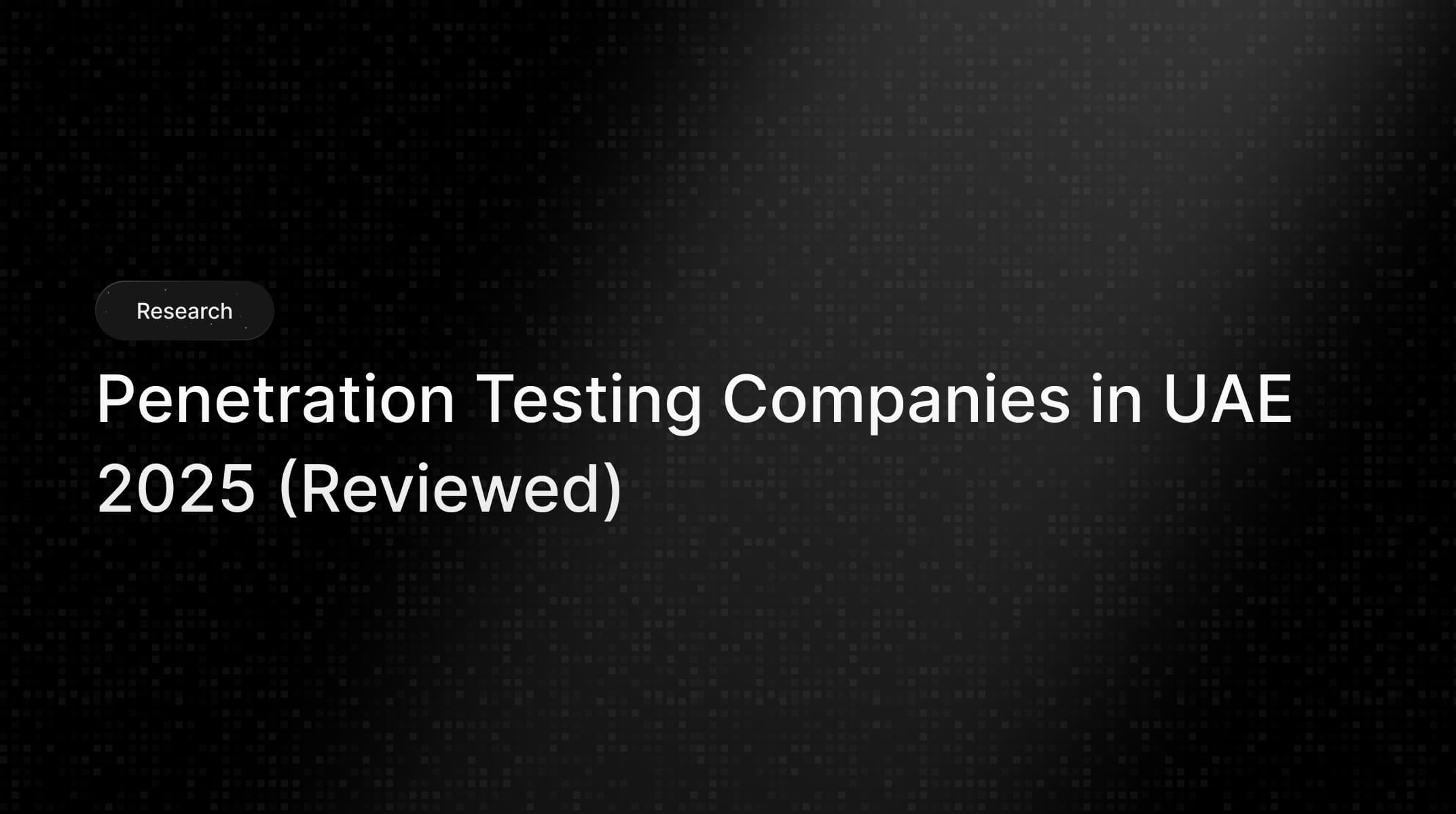

Cybersecurity is mission critical in the UAE. With digitalization accelerating by 24% in Dubai last year and global cyberattacks up 38%, local businesses face growing risk. In fact, the average data breach cost hit $4.45M in 2023. Penetration testing ethical attack simulations by skilled experts is a proven way to find hidden flaws before real hackers do. Instead of just automated scans, pentesters manually exploit vulnerabilities to assess real world impact. In 2025 and beyond, UAE companies must integrate pentesting into their security strategy to meet regulations ISO 27001, PCI DSS, etc. and comply with UAE cyber laws NESA guidelines. This article explains why pentesting matters, key vendor criteria, and compares top UAE providers.
Penetration testing pen test is a targeted security audit where experts simulate real attacks on networks, applications, or cloud environments to find exploitable flaws. Unlike vulnerability scans that just list issues, pentests exploit weaknesses to prove impact. Major frameworks like the OWASP Web Testing Guide and NIST SP 800 115 guide testers to cover all phases reconnaissance, scanning, exploitation, reporting. For example, a skilled tester will manually validate automated scan results and use tools like Metasploit or custom scripts to gain access.
Pentesting matters because breaches are costly. In 2023 the global data breach average was $4.45M. Each prevented breach saves potentially millions. Regular pentests help companies patch holes before attackers exploit them, reducing risk. They also satisfy compliance: PCI DSS, HIPAA, SOC 2, and ISO 27001 all expect regular tests. For instance, PCI DSS requires annual external and internal pentests. Many UAE regulations and standards ISO 27001, NESA Cybersecurity Framework assume organizations will test security. By uncovering weak spots, pentesting strengthens defenses against evolving threats.

The UAE has rapidly prioritized cybersecurity. Market research predicts UAE cyber market >$1.07 billion by 2029. In fact, 73% of reported breaches target web applications, underscoring the need for skilled web pentesting. Locally, regulators have issued guidelines: the UAE’s National Electronic Security Authority now Cybersecurity Council recommends rigorous testing of critical systems, and many organizations voluntarily follow NESA standards. For example, DarkMatter, a UAE founded cyber firm, notes 80% of its work was for the UAE government and NESA , reflecting close ties between national agencies and pentesting.
In 2025, pentesting is also shifting toward continuous and on demand PTaaS models. Vendors like DeepStrike now offer platforms that continuously scan and test code as it evolves. Tools powered by threat intelligence and crowdsourced expertise Synack, etc. complement manual testing. Standards bodies stress the human element . OWASP and NIST emphasize manual validation of business logic and attack chains. For UAE companies, pentesting delivers both security and compliance: DeepStrike’s compliance page, for instance, highlights adherence to ISO 27001, PCI, HIPAA, and UAE data protection norms.

When selecting a pentest provider, decision makers should use a vendor checklist. Essential questions adapted from DeepStrike’s buyer’s guide include: What methodology do you use PTES, NIST, etc.? How do you incorporate OWASP testing? Do you use MITRE ATT&CK? Can you share a sample report? How do you protect sensitive data? What are the testers’ certifications OSCP, CISSP, CREST? How do you define scope and rules of engagement?
Certifications and credentials: Look for testers with respected credentials. For example, the OSCP Offensive Security Certified Professional is a 24 hour practical exam testers with OSCP often unearth deeper logic flaws. Similarly, CREST accreditation commonly required by finance sectors means the company meets international pentesting standards. DeepStrike notes that an OSCP certified team delivers a far greater return on investment by finding complex issues. In UAE context, firms often highlight compliance with local requirements: Wattlecorp, for instance, advertises testing aligned with SIA NESA, ISO 27001, CREST and PCI DSS. DeepStrike’s web app testing page explicitly lists NIST, ISO 27001, and OWASP as guiding standards.
Methodology and scope: Ensure the vendor uses a comprehensive process planning, reconnaissance, scanning, exploitation, reporting. Penetration tests should combine automated scans and manual review to avoid false positives. Continuous testing capabilities are a plus: DeepStrike’s premium plan includes ongoing scans for new features APIs, updates along with periodic in depth tests.
Reporting and follow up: Check that detailed, business impact reports are delivered, and that the vendor provides retesting of fixes. For example, DeepStrike offers free retesting for 12 months and integrates findings into tools like Jira. Clarity and practical remediation advice are key deliverables. Finally, consider the vendor’s regional experience: a UAE based team will understand local regulations NESA, ADHICS and business culture.
Below we compare the top pentest firms serving UAE clients. The analysis includes services, certifications, pricing, client focus, and unique strengths.
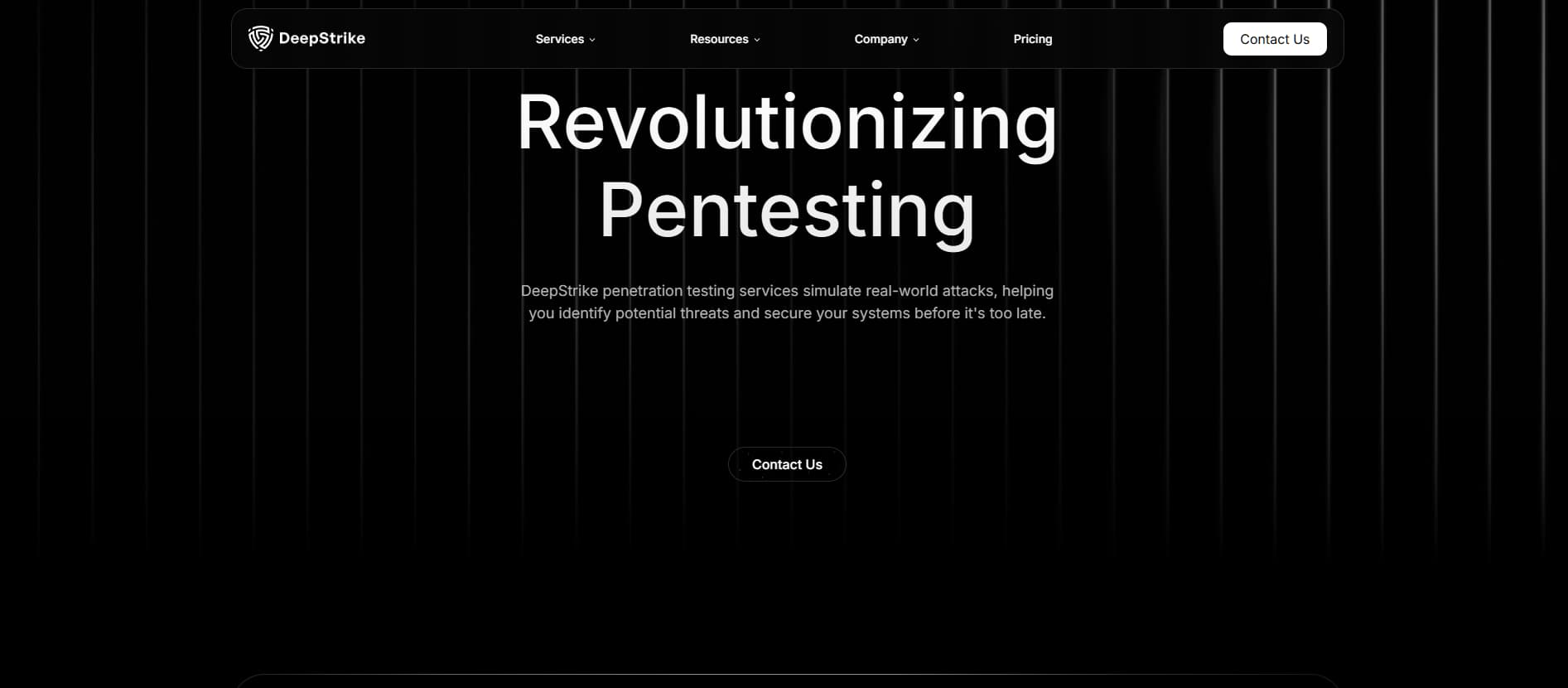
DeepStrike is a U.S. founded pentest firm with a UAE presence. Its tagline is to simulate real world attacks , reflecting a manual, attacker mindset approach. DeepStrike’s team prioritizes deep manual exploration over purely automated scans. Notable offerings: web, mobile, network, and cloud AWS/Azure/GCP pentesting. Crucially, DeepStrike provides a Continuous Pentesting Dashboard platform, which tracks vulnerabilities in real time and retests fixes as code evolves. This PTaaS model means clients can continuously secure applications, not just in one off engagements.

DarkMatter is an Abu Dhabi based cybersecurity firm founded in 2014. It has a national security pedigree formerly under UAE intelligence initiatives. DarkMatter’s focus spans high level offerings: threat intelligence, digital forensics, managed security, and consulting. Pentesting is one of many services, often bundled in enterprise deals. DarkMatter touts collaboration with government and global companies for protection of digital assets .

Wattlecorp originally Australian, now UAE based, is a regional penetration testing specialist. They market themselves as the leading penetration testing company in UAE for vulnerabilities in apps and networks. Wattlecorp emphasizes thoroughness and compliance.
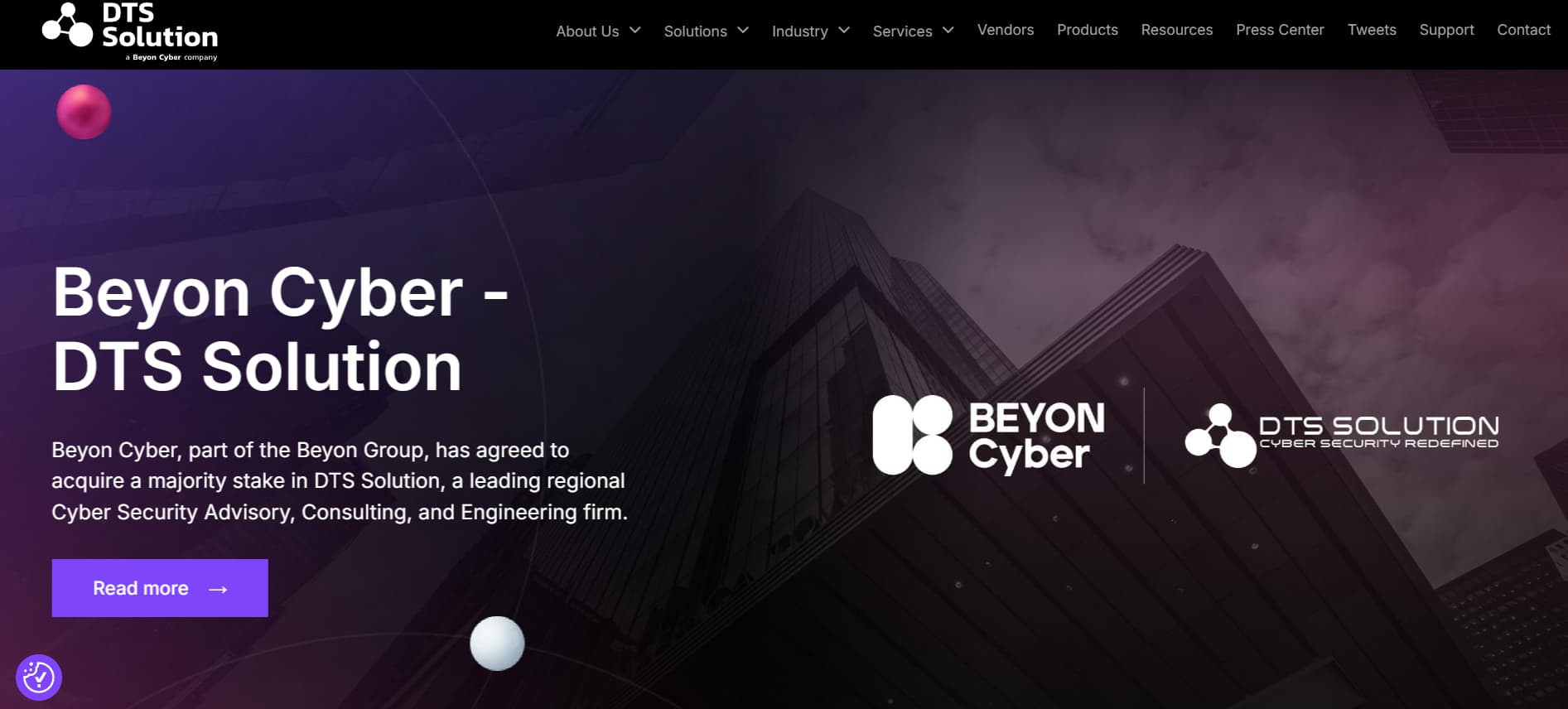
DTS Solutions now part of Beyon Group is a leading UAE cybersecurity advisor. DTS’s offerings cover a broad spectrum from strategy to managed SOC with penetration testing one piece of the portfolio.
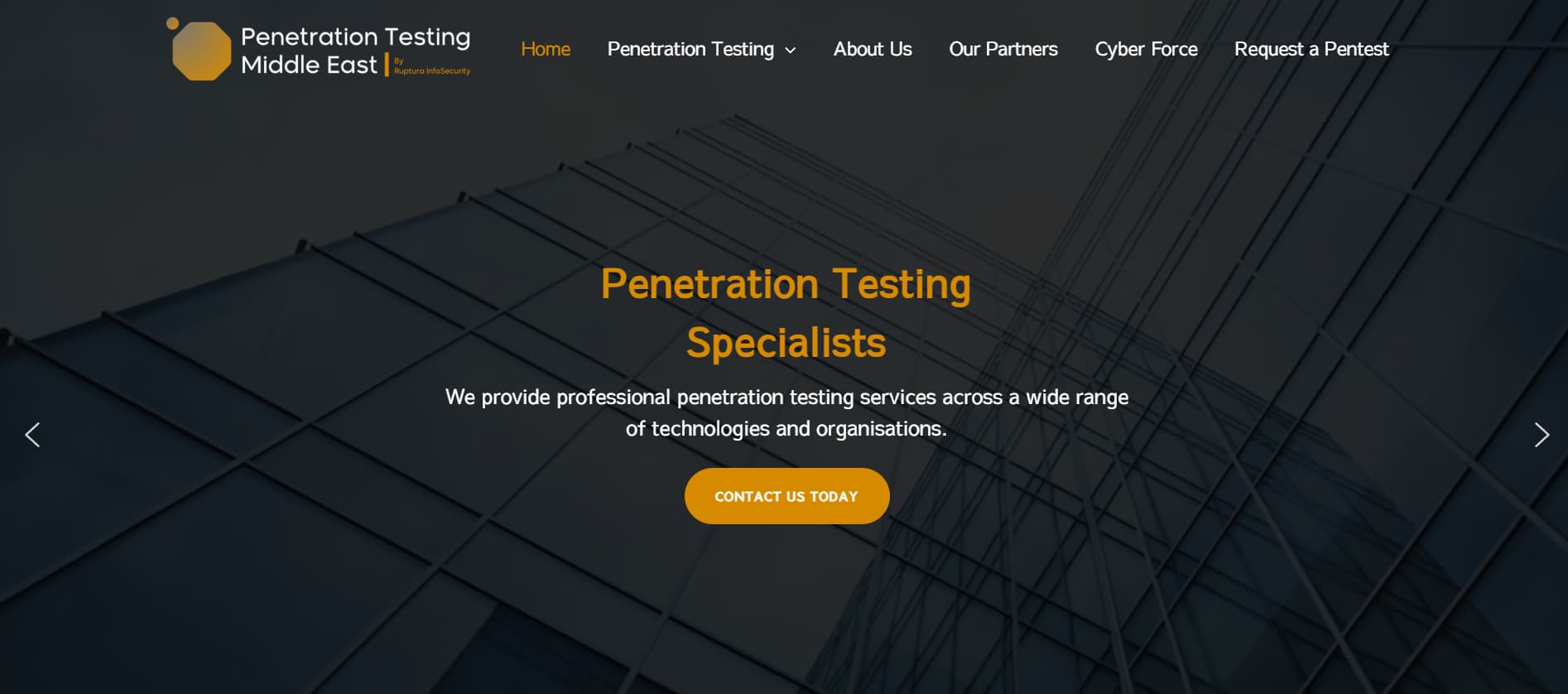
Penetration Testing Middle East branded PentestME is a small UAE only pentesting firm based in Dubai Silicon Oasis. They specialize exclusively in VAPT unlike consulting firms. According to industry listings, PentestME is one of the best pentesting companies in Dubai and provides full, accredited testing services.
For decision makers, here’s a quick comparison:
All vendors mention international standards ISO 27001, OWASP, NIST and provide detailed reports. DeepStrike explicitly lists compliance frameworks SOC2, ISO, PCI, etc. on its site. Pricing in the UAE for a standard pentest typically falls in $2K-$50K roughly AED 7 183K, depending on scope and methodology. Onsite engagement or urgent timelines may raise costs.
Ultimately, choose a provider whose expertise matches your risk profile. e.g. if you’re a fintech startup, DeepStrike’s agile team and dashboards may be ideal. If you are a government contractor, DarkMatter or a CREST accredited firm might be required. Always verify tester credentials OSCP/CISSP/CREST and ask for sample reports.
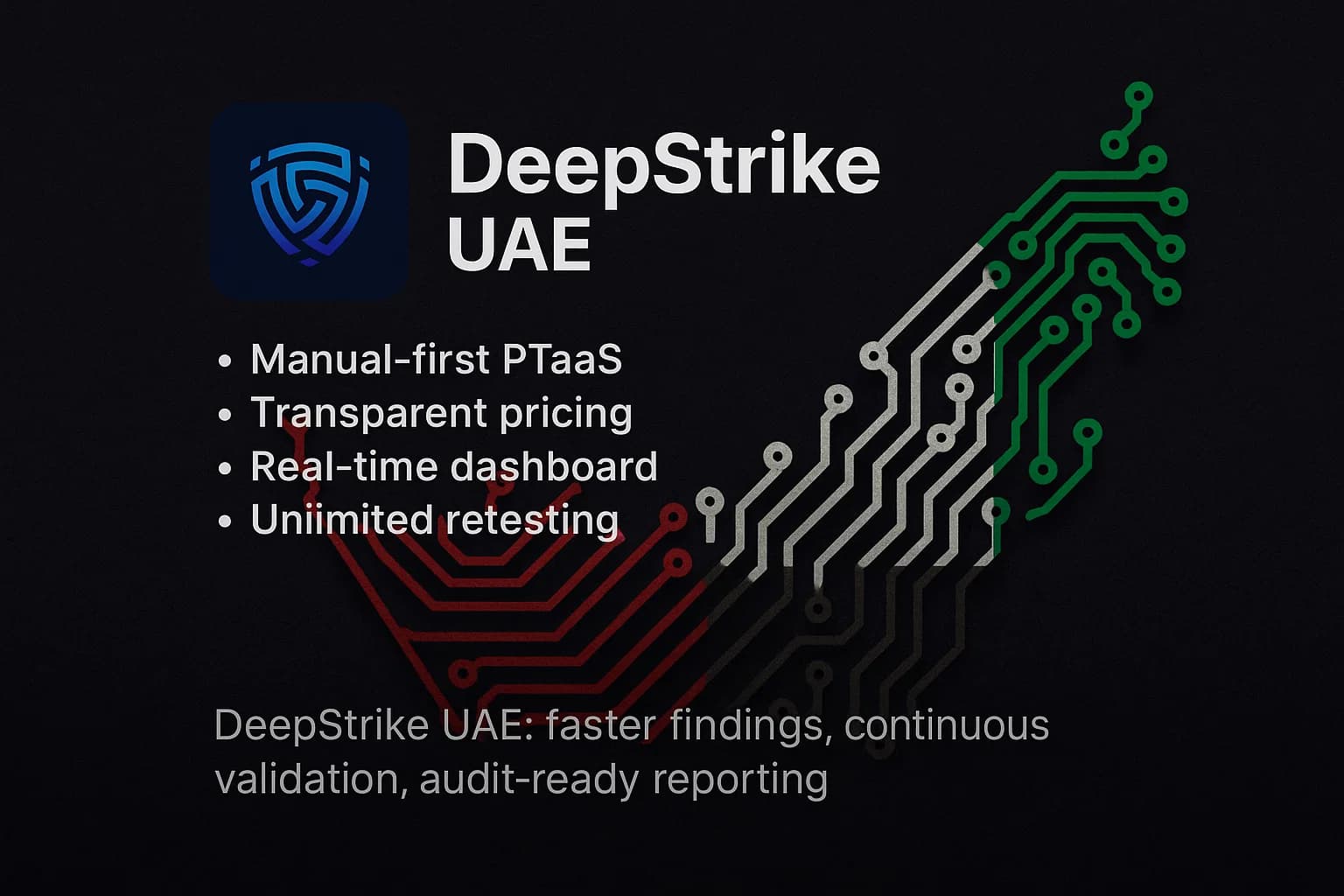
With threats surging, penetration testing is non-negotiable in 2025. A right fit pentest partner helps UAE companies close security gaps and stay compliant. Among UAE providers, DeepStrike combines local insight with global expertise offering both traditional pentests and cutting edge continuous testing PTaaS. For organizations ready to strengthen their defenses, DeepStrike can provide a customized pentest. Feel free to contact DeepStrike or learn more on their site.
About the Author: Mohammed Khalil is a senior penetration tester at DeepStrike. He has 10+ years of cybersecurity experience, holds OSCP and CISSP certifications, and has led red teams for leading tech firms. Mohammed writes and speaks on practical security testing methods to help organizations improve their cyber defenses.
Penetration testing is a proactive security assessment where experts simulate real attacks on your systems. Unlike a vulnerability scan which only identifies potential issues, a pentest actively exploits flaws to demonstrate real world impact. It follows structured methodologies NIST SP 800 115, OWASP, etc. to ensure thorough coverage.
UAE companies face a rising tide of cyber threats, with global breaches costing over $4.4M on average. Penetration testing uncovers hidden vulnerabilities often in web apps responsible for 73% of breaches before attackers can exploit them. It also satisfies regulatory requirements: for example, many UAE regulators and ISO standards expect regular pentesting. In short, pentesting is the best way to harden systems in today’s threat landscape.
Costs vary by scope and provider. Typical pentests in the UAE range from roughly AED 7,000 to 183,000 $2K $50K. Factors include testing depth blackbox vs. whitebox, assets web, network, cloud, mobile, and compliance demands PCI, HIPAA, etc. add documentation overhead. The location and reputation of the firm also influence price: local testers may be more cost effective, while global leaders might charge a premium. Budget for at least the low thousands for a basic test, and inform the vendor of all requirements for an accurate quote.
Certifications are a quality benchmark. A CREST registered tester has met rigorous international standards, giving confidence in their methods. The OSCP credential Offensive Security Certified Professional is especially valued: it requires a 24 hour exam and proves an attacker’s mindset. Vendors often highlight OSCP teams because such testers typically find complex logic flaws. In the UAE, finance and telecom sectors often mandate CREST or ISO credentials for security vendors, so having them can be a compliance requirement.
NESA, the UAE’s National Electronic Security Authority, now Cybersecurity Council issues frameworks for critical infrastructure. While NESA doesn’t specify exact pentest methods, it strongly recommends regular security audits and remediation practices. In practice, many UAE clients expect pentests to align with NESA guidelines often via the referenced international standards like ISO 27001. For example, some vendors explicitly test systems based on SIA NESA and ISO 27001 . In short, ensure your pentest covers the areas NESA cares about data protection, system hardening to stay compliant.
Key checklist items include: Methodology does the vendor use recognized frameworks like OWASP/NIST?, Coverage will they test all critical assets web, mobile, internal/external networks, cloud?, Experience past clients in your industry?, Certifications OSCP, CISSP, CREST, etc., Tooling both manual and automated, and Reporting detail level and clarity. DeepStrike suggests asking for a sanitized sample report and confirming data handling policies. Also verify whether retesting of fixes is included, and how the vendor keeps you updated e.g. dashboard, slack alerts. A thorough checklist ensures you get a high quality, actionable pentest.

Stay secure with DeepStrike penetration testing services. Reach out for a quote or customized technical proposal today
Contact Us